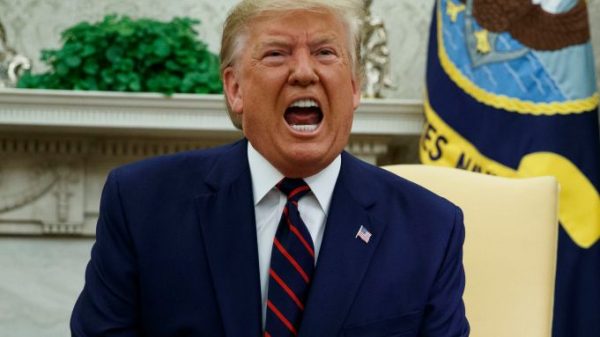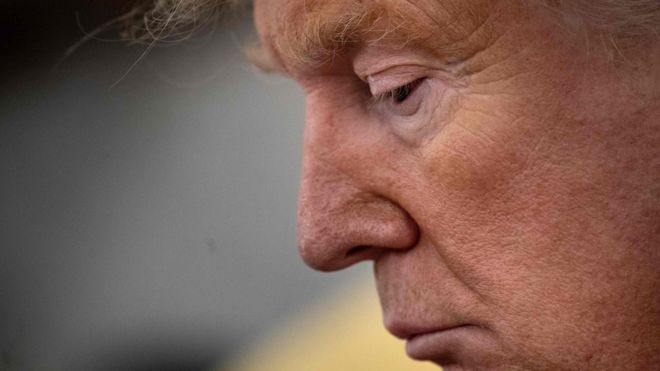Trump impeachment: House votes to formalise inquiry
- Posted on
- Comment

Donald Trump, Sauli Niinisto. President Donald Trump speaks during a meeting with Finnish President Sauli Niinisto in the Oval Office of the White House, in Washington
Trump, Washington, USA – 02 Oct 2019
The US House of Representatives has passed a resolution to formally proceed with the impeachment inquiry against President Donald Trump.
The measure detailed how the inquiry will move into a more public phase and was not a vote on whether to impeach the president.
The vote was the first formal test of support for impeachment in the Democratic-controlled house.
The White House condemned the vote, which passed along party lines.
Only two Democrats – representing districts that Mr Trump won handily in 2016 – voted against the resolution, along with all Republicans, for a total count of 232 in favour and 196 against.
The resolution also sets out the rights Mr Trump’s lawyers would have.
President Trump is accused of trying to pressure Ukraine into investigating unsubstantiated corruption claims against his political rival, Joe Biden, and his son who worked with Ukrainian gas company Burisma.
Mr Trump denies wrongdoing.
After the vote, the White House Press Secretary said in a statement: “Speaker Pelosi and the Democrats have done nothing more than enshrine unacceptable violations of due process into House rules.”
Also on Thursday, another White House official present on the Ukraine call began testifying, and was expected to corroborate earlier statements about conditions placed to the release of US military aid to Ukraine.
Republicans have criticised Democrats for the closed hearings up to this point, in which Republican lawmakers have also taken part. But Democrats insist they were needed to gather evidence ahead of the public stage of the inquiry, and deny allegations they have been secretive.
The vote moves the inquiry into a new phase, which could eventually see articles of impeachment recommended against Mr Trump. If that happened, and the House voted to pass the articles, a trial would be held in the Senate.
What will the resolution say?
Earlier this week, Democrats in the House released an eight-page document setting out the two-stage process for the next phase of the inquiry.
In the first stage, the House Intelligence Committee will continue its investigations and hold public hearings. It will have the right to make public transcripts of depositions taken in private.
Trump impeachment: Last week was the most dramatic so far
In the second stage, a public report on the findings will be sent to the House Judiciary Committee which would conduct its own proceedings and report on “such resolutions, articles of impeachment, or other recommendations as it deems proper”.
President Trump’s lawyers will be allowed to take part in the Judiciary Committee stage. Republicans on the committees will be able to subpoena documents or witnesses although they could still be blocked as both committees are controlled by Democrats.
Democrats are planning public hearings to be held in coming weeks and are considering the possibility of drafting articles of impeachment against the president.
What’s behind the impeachment inquiry?
At the heart of the impeachment inquiry, which was announced by House Speaker Nancy Pelosi last month, is a phone call on 25 July between Mr Trump and Ukrainian President Volodymyr Zelensky.









 (Selorm) |
(Selorm) |  (Nana Kwesi)
(Nana Kwesi)